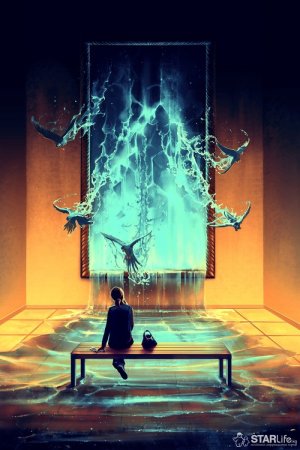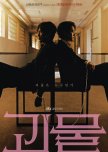Această recenzie poate conține spoilere
The drama Beyond Evil as a philosophical parable about human relationships.
The plot of Beyond Evil is well twisted, and a new intrigue is revealed behind each denouement. But at the same time, already in the first episodes, I felt that Beyond Evil could be more than just a good detective. And I was not wrong.
From the very first episodes, we plunge into the drama, like into a fabulous whirlpool. We get to know the life of a provincial town. We watch Lee Dong Sik intently, trying to figure out what is behind his extravagant behavior. Shin Ha Kyun in this role masterfully balances on the border of light and shadow, sober calculation and madness. In the meantime, we are wondering who he is - a "fallen angel" or a bright angel who fell from a height and broke his wings. We look into the faces of all the heroes, trying to determine which of them is the monster. And gradually we are imbued with the mesmerizing beauty of this world and its inhabitants.
At first, Han Joo Won was perceived as an outsider. "Young master" in an expensive suit, completely alien among the ordinary people of Manyang. And it's not just about social status. Han Joo Won chose this role for himself - an independent observer who looks from above at the ugliness of this world and does not touch the dirt. However, the further he progresses in his research, the more personal it becomes, and the mask of equanimity slips from his face. This is how a classic detective story turns into a psychological journey - to feelings and memories walled up in the basements of the soul, into a journey to someone else and to oneself. Because these two processes always go together - to find yourself, you need to see the other and be seen. Find your own reflection in the other person's eyes.
The drama Beyond Evil is a real maze of reflections. Each significant event, the history of each hero has its own reflection. Some of them are false, some of them are true, but all these fragments, put together, allow you to see the truth. There is such a method of image restoration - from several dull and even distorted reflections, you can recreate a real image. We recognize heroes by the way they are reflected in each other. And each new meeting, each new dialogue is another step towards finding a real face. This approach makes the image of each character multidimensional and deep.
The drama really captures all aspects of the relationship. Family relationships – healthy or toxic. Relations with oneself, relationships with the world, social relationships - the law and its implementation. Morality as the ability to contact. Breaking up relationships like disappearing. The attitude towards the deceased loved ones and the ways of dealing with loss, with death. Relationships are alive, supportive and healing. Relationships are codependent, burdensome and suffocating. Personality always lives in a relationship. Fencing off from the world, a person cuts off a part of himself and, ultimately, can completely die as a person. This is how a person turns into a monster.
“Everyone in the city is like one family,” says Han Joo Won of the residents of Manyang. And he is absolutely right. All heroes are connected to each other by a whole network of threads. But somewhere these are the supporting threads of life, and somewhere they are suffocating fetters. The family image is central to the drama. Everything begins with it - everything ends with it. For each of the heroes, this word means something different - a project, a burden, a duty, a dream of absolute happiness. But for everyone, it carries a lot of weight. Thus, a small town turns out to be a global metaphor for a community, a social family, in which our humanity is born, but sometimes dies.
The density of connections and meanings in the drama is so great that not only each character, but the whole world of the drama is felt as something living, animated. The city of Manyang is not just a place of action, but an independent character. The whole city, as an integral living system, exists according to its own laws. The Beyond Evil story is the story of Manyang's illness and healing.
What's also great about the Beyond Evil is that there is no moralizing in it. Despite the great semantic load, the author does not reduce everything to one idea, does not teach, but shows reality in its complexity, even paradoxicality. Each character is a part of a big picture, an element of the inner life of an integral system. But also everyone is a separate unique person, with their own choice and responsibility for this choice. The story of the Beyond Evil is the story of Manyang, but it’s just as much the story of two people meeting. It is no coincidence that all the main scenes are "doubled". If you look at the titles of the episodes, you can see that the pairing is "sewn" into the very structure of the script. As if the whole story is a long dialogue between two, a series of questions and answers. Each character in the drama is interesting. Each has its own story, its own drama, its own unique personality. But the main axis of the whole story is the meeting and dialogue of the two main characters.
Lee Dong Sik and Han Joo Won, so different, but equally extraordinary, strong in spirit, but practically buried under the rubble of their own psychological trauma. Throughout the drama, they continually drift apart and collide, let go and catch each other, meeting again each time on a deeper level. They go a long way from mutual irritation, exploitation, projecting their fears and expectations onto each other, to true mutual understanding. Throughout the entire drama, the characters stare at each other - with suspicion, with rage, with interest, admiration, tenderness. But invariably - with intense attention, as if looking for something very important in each other's eyes. And in the end they find and return to each other the opportunity to be themselves - whole, feeling, alive.
In my opinion, Beyond Evil, like no other drama, showed us an example of perfect human contact. At that difficultly attainable level, when you see and accept another as he is, in his true essence. The bromance of the main characters of the Beyond Evil is so beautiful that it overshadowed all the drama love lines for me. In fact, this is a "love story" - like the love of one soul for another soul. Someone sees them as a mentor and student. Someone sees them as father and son or even as a couple in love. In my opinion, we were specially shown these relations at such a level of generalization that each viewer is free to interpret them in his own way. For me, they are the embodiment of the idea of an existential meeting, beyond any categories.
The Beyond Evil is a theatrical chamber drama. But this simplicity of the means has a deep meaning. The real challenge for an artist is to show everyday reality as something magical, wonderful, and sometimes monstrous. And the Beyond Evil succeeded to create a heroic epic in the scenery of a small provincial town, where a butcher's shop, the basement of an old house or a reed field feel like a mystical place. Where dramatic battles and wonderful metamorphoses take place in the dialogues between the characters. Magic is created in the Beyond Evil, not taking away from reality, but immersing it in it. This is the fantasy world that really exists - in the space of the human psyche, in relationships between people.
This is a huge burden on the actors. They don't just need to play their characters, the actors pretty much create the world and atmosphere of the drama. And they also need to show the development and even the rebirth of their characters. Many characters in the drama wear masks. But in the end all the masks will be removed, ripped off or washed away by the rain. And under someone's mask we will find a monstrous grin, and under someone's - a beautiful face. Shin Ha Kyun and Yeo Jin Goo play characters whose faces change throughout the drama. In each new episode, they experience new trials, different emotions, but their eyes express not only situational emotions, but also profound personality changes. In some scenes, they need to act so subtly that it is like walking on a tightrope. A slightly different expression - and the impression would be wrong. But the actors are perfect in every shot.
The talent of all the participants has created an amazing artistic world. It's like the famous Doctor Who machine - more inside than outside. And you can dive into this depth over and over again, finding new nuances and meanings.
Considerați utilă această recenzie?










